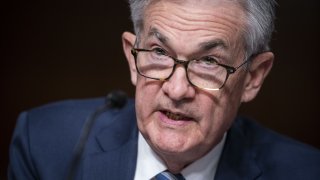
The Federal Reserve concluded Wednesday its January monetary policy meeting, indicating that a potential rate hike could come in March. The major stock market averages initially jumped around 2 p.m. ET, when the Fed released its policy statement. However, stocks gave up those gains and turned lower as Chairman Jerome Powell answered questions from reporters. Check out the full recap below.
Stocks hit fresh session lows, rates rise amid Powell remarks
The major averages hit fresh session lows at around 3:20 p.m. ET, as traders assessed Fed Chairman Jerome Powell's comments on monetary policy and the potential for even more inflation going forward.
Feeling out of the loop? We'll catch you up on the Chicago news you need to know. Sign up for the weekly Chicago Catch-Up newsletter here.
The Dow was down about 350 points, or 1%. The S&P 500 and Nasdaq Composite dipped 0.9% and 0.7%, respectively.
Meanwhile, rates rose as Powell spoke. The benchmark 10-year yield traded around 1.83%, and the 2-year rate traded at 1.1%.
Money Report
—Fred Imbert
We will eventually get relief on the supply side, Powell says
—Fred Imbert
Powell says there is upside risk to inflation
Jerome Powell said that there's a risk that inflation will not decline back toward its pre-pandemic levels any time soon, and that the rise in prices could accelerate.
"Inflation risks are still to the upside in the views of most FOMC participants, and certainly in my view as well. There's a risk that the high inflation we are seeing will be prolonged. There's a risk that it will move even higher. So, we don't think that's the base case, but, you asked what the risks are, and we have to be in a position with our monetary policy to address all of the plausible outcomes," Powell said.
Powell also mentioned that supply chain issues were taking longer to be resolved than the Fed had originally anticipated.
—Jesse Pound
Stocks give up sharp gains, Dow down more than 200 points
Stocks gave up their sharp gains from earlier in the day, as traders weighed Fed Chairman Jerome Powell's comments.
The Dow traded more than 200 points lower, or 0.6%. The S&P 500, which had risen as much as 2.2%, slid 0.6%. The Nasdaq Composite was down 0.6%, erasing a 3.4% gain.
—Fred Imbert
Reducing the balance sheet will take some time, Powell says
Fed Chairman Jerome Powell said it will take a while for the central bank to unwind its massive balance sheet going forward.
"The balance sheet is substantially larger than it needs to be," Powell told reporters. "There's a substantial amount of shrinkage in the balance sheet to be done. That's going to take some time. We want that process to be orderly and predictable."
—Fred Imbert, Jeff Cox
Powell has to 'walk a tightrope'
"Chairman Powell has to walk a tightrope – he needs to communicate that the Fed is 100% committed to bringing inflation back down to 2%, while not causing a recession or stock market crash by tightening monetary policy too quickly," said Chris Zaccarelli, chief investment officer for Independent Advisor Alliance.
"The stock market is especially vulnerable to higher rates and the removal of the tailwind that the Fed's asset purchases have provided for the past two years. We believe the economy will stay out of recession and the bull market in stocks will continue this year, but we are concerned that the volatility we have already witnessed this month will increase in the months ahead and would exercises caution in the near term," he added.
—Pippa Stevens
'Economy no longer needs sustained high levels of monetary policy support,' says Powell
Fed Chair Jerome Powell told reporters on Wednesday that the economy is strong enough on its own, without intense monetary policy support.
"In light of the remarkable progress we've seen in the labor market and inflation that is well-above our 2% long-run goal, the economy no longer needs sustained high levels of monetary policy support," Powell said during a press conference.
"That is why we are phasing out our asset purchases...and we expect it will soon be appropriate to raise the target range for the federal funds rate," added Powell.
—Maggie Fitzgerald
Dow gives up gains, drops 100 points
The Dow Jones Industrial Average gave up its earlier gains, after Fed Chairman Jerome Powell said there's room for the Fed to further raise rates.
The Dow traded more than 100 points lower after rallying as much as 517.94 points.
—Fred Imbert
Labor market can withstand rate hikes, Powell says
The Federal Reserve can raise interest rates without hurting the recovery of the labor market, according to Jerome Powell.
"I think there's quite a bit of room to raise interest rates without threatening the labor market," Powell said.
The Fed Chair pointed to the fact that job openings currently outnumber unemployed Americans as one reason that the labor market is "very, very strong."
The headline unemployment rate has fallen below 4%, though labor force participation is still below its pre-pandemic level.
—Jesse Pound
Powell says the Fed is committed to price stability goals
Fed Chairman Jerome Powell said that high inflation has imposed significant hardship on people, especially those struggling with the higher cost of essentials like food and housing. Price stability, he added, is key for the Fed to support a long expansion.
"We're committed to our price stability goals," he said in the press conference. "We will use our tools both to support the economy and a strong labor market and to prevent higher inflation from becoming entrenched."
—Tanaya Macheel
Jim Caron touts Fed's balance sheet as the "absolute critical policy measure for this year."
Jim Caron of Morgan Stanley Investment Management said Wednesday that he has his eyes on the Federal Reserve's balance sheet as the "absolute critical policy measure for this year." His comments come after the Fed signaled an interest rate hike will come in March and announced plans to shrink its balance sheet.
"The balance sheet is really the area that I think that the Fed can actually start to finetune at least the backend of the curve … that's the only real way that they can keep backends higher," Caron said. "There needs to be some complementary moves here. Maybe they do less rate hikes and they do more with the balance sheet … it's gonna matter a lot for asset prices."
—Krystal Hur
Fed watching wages as an inflation pressure, Powell says
Jerome Powell highlighted that rising wages, something central bankers wanted to see for much of the last decade during the previous economic recovery, may be a negative in the fight against inflation.
"Wages have also risen briskly, and we are attentive to the risks that persistent real wage growth in excess of productivity could put upward pressure on inflation," the Fed Chair said.
—Jesse Pound
Stocks off highs, rates rise as Powell news conference kicks off
The major averages traded off their session highs, as Fed Chairman Jerome Powell started taking questions from the media on the central bank's latest policy announcement.
The Dow traded about 300 points higher after jumping the about 500 points earlier in the day. The S&P 500, which was up more than 2% at one point, traded 1.6% higher. The Nasdaq Composite was up 2.4% after jumping as much as 3.4%.
—Fred Imbert
Clarity from Fed should calm markets, investor says
The market should breathe a sigh of relief after the Federal Reserve provided some clarity on when and how much it will raise interest rates, according to Comerica Wealth Management CIO John Lynch.
"Clarity on the timing and extent of rate hikes, as well as the degree of balance sheet reduction, should help calm markets," Lynch said. "We believe left unto normal market forces, the U.S. Treasury yield curve will gradually steepen given global cyclical recovery and less severe pricing pressures."
—Yun Li
The Fed's plans for shrinking its balance sheet
The Federal Reserve did not specify in its main statement when it might begin to reduce its bond holdings that have caused its balance sheet to swell to nearly $9 trillion.
But in a separate statement released Wednesday, the Fed said it would start shrinking the balance sheet after raising interest rates.
"The Committee expects that reducing the size of the Federal Reserve's balance sheet will commence after the process of increasing the target range for the federal funds rate has begun," the statement said.
Some investors hoped the central bank would hold off on shedding its bond holdings immediately with rate hikes. The extra statement could be one reason stocks came off their highs.
Fed statement was 'innocuous,' Wells Fargo's Schumacher says
Wells Fargo rates strategist Michael Schumacher called the Fed statement "innocuous," noting that the central bank's comments on tapering were largely expected.
"It's going to revolve around what [Chairman Jerome Powell] says about the balance sheet at the press conference," Schumacher said. "People are taking this as a pretty middle of the road statement, not a lot to digest; looking more to the press conference to get a better read."
—Fred Imbert, Patti Domm
What has changed in the new Fed statement
Click here for a comparison between Wednesday's Federal Open Market Committee statement and that of Dec. 13.
—Fred Imbert
Stocks jump after Fed announcement is released
The major averages jumped to their highs of the day following the release of the Fed's latest monetary policy announcement.
The Dow Jones Industrial Average was briefly up about 500 points, or 1.4%. The S&P 500 gained 2.2%, and the Nasdaq Composite added 3.3%.
The benchmark 10-year Treasury note yield ticked higher after 2 p.m. ET to 1.7995%.
—Fred Imbert
Fed keeps rates unchanged
The Federal Reserve kept interest rates unchanged Wednesday, but signaled that a rate hike may be coming in March.
In a statement, the central bank's policymaking committee said a quarter-point hike is likely coming soon. That would be the Fed's first rate hike since 2018.
"With inflation well above 2 percent and a strong labor market, the Committee expects it will soon be appropriate to raise the target range for the federal funds rate," the statement said.
—Fred Imbert, Jeff Cox
A quick look at the markets ahead of the Fed decision
Let's take a look at where the markets stand roughly 30 minutes ahead of the Fed decision:
- Dow Jones Industrial Average: up 314 points, or 0.9%
- S&P 500: up 1.6%, led by gains in the tech sector
- Nasdaq Composite: up 2.5%, as Microsoft surged 4.9%.
- 10-year Treasury yield: 1.78%, roughly flat on the day
- 2-year Treasury yield: 1.028%, marginally higher on the session
- Gold: down 1.2% at $1,831.10 per ounce
- U.S. oil (WTI): up 2.3% at $87.55 per barrel
- Brent oil: up 2.2% at $90.17 per barrel
—Fred Imbert
These stocks could do well as inflation rises
With the Fed expected to signal it will tighten monetary policy this year to stave off a surge in inflation, Credit Suisse strategist searched for stocks that could do well in this type of environment.
The firm said earlier this month that energy names like Devon Energy and Diamondback energy could outperform with inflation running hot. In tech, Credit Suisse said Hewlett Packard Enterprise and Micron Technology stand to benefit from this recent inflationary surge.
Read more about the analysis here.
—Fred Imbert
What to expect from the Fed
The Federal Reserve is expected to signal that it's ready to start raising rates as soon as March. It's also expected to signal that other policy tightening measures may be taken to fight the recent inflationary pressures.
"We don't expect them to sound dovish," Mark Cabana of Bank of America told CNBC on Tuesday. "We don't think the Fed is going to come out and tell the market it's wrong for pricing in four rate hikes this year."
Last month, Fed officials signaled the expected at least three rate hikes in 2022. However, traders are currently trading at least four rate increases for this year, according to the fed funds futures.
—Fred Imbert, Patti Domm






